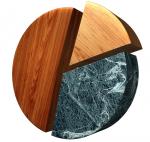
A new poll from the Associated Press and GfK asked (PDF) respondents not whether they agree or disagree, but how confident they are, about various claims about science. The Associated Press (April 21, 2014) summarized, "Americans have more skepticism than confidence in global warming, the age of the Earth and evolution and have the most trouble believing a Big Bang created the universe 13.8 billion years ago."
Consistently with similar polls, political views and religious views were connected to views on science: the story observed that "Democrats [were] more apt than Republicans to express confidence in evolution, the Big Bang, the age of the Earth and climate change" and that "[c]onfidence in evolution, the Big Bang, the age of the Earth and climate change decline sharply as faith in a supreme being rises."
Asked about "The universe is so complex, there must be a supreme being guiding its creation," 54% of respondents indicated that they were extremely or very confident in its correctness; 18% were somewhat confident; 25% were not too or not at all confident.
Asked about "The average temperature of the world is rising, mostly because of man-made heat-trapping greenhouse gases," 33% of respondents indicated that they were extremely or very confident in its correctness; 28% were somewhat confident; 37% were not too or not at all confident.
Asked about "Life on Earth, including human beings, evolved through a process of natural selection," 31% of respondents indicated that they were extremely or very confident in its correctness; 24% were somewhat confident; 42% were not too or not at all confident.
Asked about "The Earth is 4.5 billion years old," 27% of respondents indicated that they were extremely or very confident in its correctness; 33% were somewhat confident; 36% were not too or not at all confident.
Asked about "The universe began 13.8 billion years ago with a big bang," 21% of respondents indicated that they were extremely or very confident in its correctness; 25% were somewhat confident; 51% were not too or not at all confident.
"Those results depress and upset some of America's top scientists," the Associated Press observed. Among those consulted for comment were Francisco J. Ayala, a member of NCSE's board of directors, and Nobel laureate and NCSE member Randy Schekman, who commented, "Science ignorance is pervasive in our society, and these attitudes are reinforced when some of our leaders are openly antagonistic to established facts."
The story noted, "The AP-GfK Poll was conducted March 20-24, 2014, using KnowledgePanel, GfK's probability-based online panel designed to be representative of the U.S. population. It involved online interviews with 1,012 adults and has a margin of sampling error of plus or minus 3.4 percentage points for all respondents. Respondents were first selected randomly using phone or mail survey methods and were later interviewed online."
